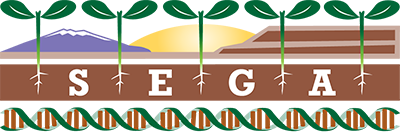SEGA is an array of highly instrumented field sites spanning a large elevation gradient as an effective proxy for climate change research. The SEGA platform helps researchers to explore and quantify ecological/evolutionary responses to changing climate at scales from genes to ecosystems.
SEGA invites new researchers to bring research projects – or participate and collaborate with existing work.
Consisting of:
- ten gardens
- a 1615 meter (5,300 feet) elevation gradient
- habitats from desert, semi-arid grassland to alpine forest (within a single ecoregion)
- mean annual temperatures ranging from 2.4 - 14.5°C and annual precipitation from 153 - 1292 mm
Growing the same plant species and genotypes (plants with the same genetic makeup) at sites across this elevation gradient with a systematic variation in temperature and moisture regimes, allows scientists to discover which species and genes are most likely to survive and reproduce during drought and predicted climate warming. Reciprocal transplant experiments between sites are an additional testing ground for the potential of plant species to adapt to changing climatic conditions.
The near real-time environmental data via a sophisticated engineering infrastructure developed at NAU includes:
- an array of environmental sensors
- the facility to carry out multi-factor climate change manipulations
- remote controlled access to data and irrigation via wireless links.
The data is being used to analyze plant performance, soil microbial communities, canopy arthropod communities, and individual tree genomics data to identify and understand how genes respond to environmental stress. As climate change impacts our communities, economies, and natural systems, the need to develop new solutions to manage and mitigate those impacts is urgent. The SEGA site array offers a highly instrumented field infrastructure within which this vital research can occur.
SEGA also offers an exceptional training opportunities for both graduate and undergraduate students, with a combination of diverse disciplines including climate science, ecology, genetics, engineering, computing and informatics.
Research proposals are currently being accepted!
- Log in to post comments
